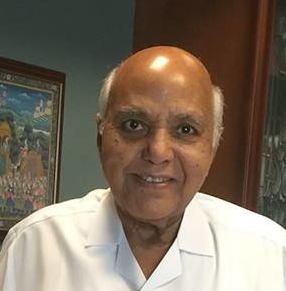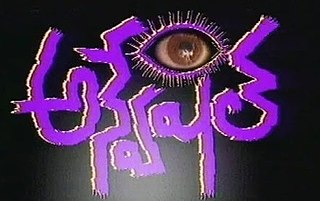
Puppetry is a form of theatre or performance that involves the manipulation of puppets – inanimate objects, often resembling some type of human or animal figure, that are animated or manipulated by a human called a puppeteer. Such a performance is also known as a puppet production. The script for a puppet production is called a puppet play. Puppeteers use movements from hands and arms to control devices such as rods or strings to move the body, head, limbs, and in some cases the mouth and eyes of the puppet. The puppeteer sometimes speaks in the voice of the character of the puppet, while at other times they perform to a recorded soundtrack.

Eenadu is the largest circulated Telugu-language daily newspaper of India sold mostly in the states of Andhra Pradesh and Telangana.

Cherukuri Ramoji Rao was an Indian businessman, media proprietor and film producer. He was head of the Ramoji Group which owns the world's largest film production facility Ramoji Film City, Eenadu newspaper, ETV Network of TV channels, film production company Ushakiran Movies.

ETV Network is a network of Telugu language news and entertainment satellite television channels in India. It is based in Hyderabad, Telangana, India. It also had some non Telugu-language satellite television channels. All non-Telugu satellite television channels were acquired by Reliance Industries-owned TV18 for ₹2,053 crore in FY 2014–15 and later rebranded.

Ramoji Group is an Indian conglomerate founded by Ramoji Rao and headquartered in Hyderabad, India. Its businesses cover television and newspaper media, film production, financial services, retail, education and hospitality. In 1996, one of its businesses, Ramoji Film City, was recognized by Guinness World Records as the largest film studio complex in the world.

Gemini TV is an Indian Telugu language general entertainment pay television channel owned by Sun TV Network. It is the first satellite TV channel in Telugu. It was launched on 9 February 1995 by the Gemini Group of Hyderabad, in association with Sun TV Network. In 1996–97, Sun TV Network acquired a controlling interest in the channel. The channel's programming consists of serials, films, film-based programs and game shows alongside some reality shows. Gemini TV HD was launched on 11 December 2011.

Tholu bommalata is the shadow puppet theatre tradition of the state of Andhra Pradesh in India with roots dating back to 3rd century BCE. Its performers are part of a group of wandering entertainers and peddlers who pass through villages during the course of a year and offer to sing ballads, tell fortunes, sell amulets, perform acrobatics, charm snakes, weave fishnets, tattoo local people and mend pots. Tholu bommalata has a history of consistent royal patronage. It is the ancestor of Wayang, the Indonesian puppet theatre play which has been a staple of Indonesian tourism and designated by UNESCO as Intangible Cultural Heritage of Humanity.
Media in Hyderabad is well-developed, and the city is covered by a large network of optical fiber cables. The city's telephone system is serviced by four landline companies: BSNL, Tata Indicom, Reliance and Airtel. There are a number of mobile-phone companies: Aircel, BSNL, Airtel, Hutch Idea Cellular, Uninor, MTS, Virgin Mobile, Tata Indicom, Tata DoCoMo, and Reliance. Several companies offer broadband internet access.

ETV is an Indian Telugu-language general entertainment pay television channel. The channel was launched on 27 August 1995 focusing on the state of Andhra Pradesh. It is a part of the ETV Network owned by Ramoji Group. It is the second oldest Telugu satellite channel after Gemini TV. It is also one of the earliest private satellite channels in South India.

Mallemala Shyam Prasad Reddy is an Indian film and television producer known for his work in the Telugu entertainment industry. He founded Mallemala Entertainments, a production company behind many successful films and TV shows. He is particularly acclaimed for pioneering the use of visual effects (VFX) in Telugu cinema.

Colors Kannada, is an Indian general entertainment channel, owned by Viacom18 that primarily broadcasts Kannada language entertainment shows. This channel is currently available in India and the United States. On the success of this channel, another channel named Colors Super, which is also a general entertainment channel, was launched on 24 July 2016. In December 2020, Colors Kannada celebrated its 20th anniversary.

Padutha Theeyaga is an Indian Telugu-language Reality television singing show that is aired on ETV Telugu, a channel of ETV Network, a part of Ramoji Group. The program seeks to discover the best singing talent in Telugu language. The show used to be hosted by S. P. Balasubrahmanyam, a legendary Playback singer from the state of Andhra Pradesh, India.
Baladitya is an Indian actor, lyricist, dialogue writer, dubbing artist, and TV host who works in Telugu cinema and television. He started out as a child artiste and is known for his roles in Edurinti Mogudu Pakkinti Pellam (1991) and Little Soldiers (1996). He is a recipient of two Nandi Awards.

Anveshitha is an Indian Telugu-language supernatural drama that aired on ETV from 1997 to 1999. Written by Ilyas Ahmed and Jyotsna, and directed by Ilyas Ahmed under the pseudonym Pradyumna, the series was produced by Ramoji Rao. It premiered on 27 August 1997 on the occasion of ETV's second anniversary and ran for 100 episodes till 21 July 1999.
ETV Andhra Pradesh is an Indian Telugu-language 24-hour news channel focusing on the state of Andhra Pradesh. The channel was launched by the media conglomerate ETV Network owned by Ramoji Group on 28 December 2003 as ETV2. Along with its rival TV9 Telugu, it is the oldest 24-hour news channel in Telugu. In May 2014, after the bifurcation of Andhra Pradesh, the channel was renamed as ETV Andhra Pradesh, while the then recently launched ETV3 channel was renamed as ETV Telangana.

Lady Detective is an Indian Telugu-language detective fiction television series directed by Vamsy. It aired on ETV from 1996 to 1997, with episodes broadcast every Thursday from 8:30 to 9:00 PM. The series features Uttara in the lead role as Sodhana, a private detective, supported by Sakshi Ranga Rao and Rama Prabha as her assistants. The show garnered significant popularity and was well received during its original run.

Santhi Nivasam is an Indian Telugu-language television drama series that aired on ETV from 2000 to 2001, spanning 273 episodes. Directed by S. S. Rajamouli in his directorial debut, the series follows Raghavayya, the patriarch of a large family living in a house named Santhi Nivasam, as they navigate familial conflicts, relationships, and societal challenges. Produced by K. Raghavendra Rao under his banner RK Teleshow, the series played a key role in shaping Rajamouli's career, laying the foundation for his transition to feature films.

Sneha is an Indian Telugu-language television series that premiered on ETV on 29 August 1995. Produced by Ramoji Rao under the Usha Kiran Movies banner, the series was directed by Vamsy and written by Suman. Starring Kaveri in the title role, Sneha is known for its investigative drama format and its focus on a strong and intelligent female protagonist.

Nagamma is an Indian Telugu-language fantasy television series that originally aired on Gemini TV from 2002 to 2006. Directed by A. R. Ramesh and written by C. Jerrold, the series ran for over 200 episodes and was broadcast weekly on Sunday nights. It was produced by Akash Khurana and Harish Thawani under Nimbus Communications.
















